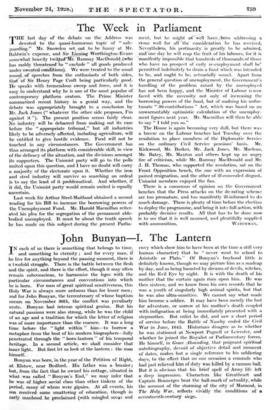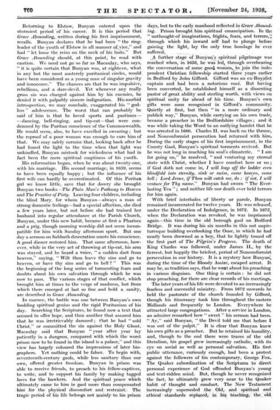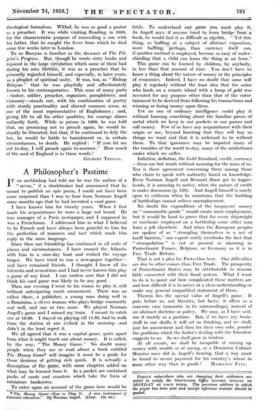John Bunyan I. The Lantern
IN each of us there is something that belongs to time, and something to eternity ; and for every man, if he live for anything beyond the passing moment, there is a twofold. struggle. There is the battle between the flesh and the spirit, and there is the effort, though it may often remain subconscious, to harmonise the logos with the particular circumstances and conventions into which he is born. For men of great spiritual sensitiveness, this Holy War is always more arduous than for lesser men ; and for John Bunyan, the tercentenary of whose baptism occurs. on November 30th, the conflict was peculiarly acute. Bunyan had intense spiritual genius. But his natural passions were also strong, while he was the child of an age and a tradition for which the letter of religion was of more importance than the essence. It was a long time before the " light within " him—to borrow a metaphor from the best of his modern biographers—fully penetrated through the " horn-lantern ". of his temporal heritage. In a second article, we shall consider that inner light. But first let us look at the lantern : the man himself.
. Runyan was born, in the year of the Petition of Right, at Elstow, near Bedford.. His father was a brazier; but, from the fact that he owned his cottage, situated in -what was called " Bonyon's End," we -may infer that he was of higher social class than other tinkers of the period, many of whom were gipsies. At all events, his son received' some smattering of education, though in early manhood he proclaimed (with mingled sco-in and envy which show him to have been at the time a still very human character) that he " never went to school to Aristotle or Plato." Of Bunyan's boyhood little is definitely known, though we may picture him as a madcap by day, and as being haunted by dreams of devils, witches, and the Evil Eye by night. It is with the death of his mother that the curtain again rises upon him. He was then sixteen, and we know from his own records that he was a youth of singularly high animal spirits, but that he was also ultra-sensitive. We cannot say what made him become a soldier. It may have been merely the lust for adventure, or sorrow at his mother's death coupled with indignation at being immediately presented with a stepmother. But enlist he did, and saw a short period of service before the Battle of Naseby ended the Civil War in June, 1645. Historians disagree as to whether he was stationed. at Newport Pagnell or Leicester, and whether he joined the Royalist or Parliamentary forces. He himself, in Grace Abounding, that poignant spiritual autobiography, devoid of objective detail and innocent of dates, makes but a single reference to his soldiering -days, to the effect that on one occasion a comrade who had just relieved him of duty was killed by a cannon ball. But it is obvious that his brief spell of Army life left a deep impression: Characters like Greatheart and Captain Boanerges bear the hall-mark of actuality, while the account of the storming of the city of Mansoul, in The Holy War, reflects vividly the conditions of a seventeenth-century siege. Returning to Elstow, Bunyan entered upon the stormiest period 'of his career. It is this period that Grace Abounding,, written during.,his first imprisonment, recalls. Bunyan declares that he had been " the ring7 leader of the youth of Elstow in all manner of, vice," and had " let loose the reins on the neck of his lusts." But Grace Abounding should, at this point, be read with caution. We need not go so far as Macaulay, who says, " it is quite certain that Bunyan was, at eighteen, what in any but the most austerely puritanical circles, would have been considered as a young man of singular gravity and innocence." The chances are that he was impulsive, rebellious, and a dare-devil. Yet whenever any really gross sin was charged against him by his enemies, he• denied it with palpably sincere indignation. His morbid introspection, we may conclude, exaggerated his god- less " adolescence. The worst that can probably be said of him is that he loved sports . and pastimes- -dancing, bell-ringing, and tip-cat—that were con- demned by the Puritan conscience of the Commonwealth. He would seem, also, to have excelled in swearing ; but the reproof of a poor woman was enough to cure him of that. We may safely surmise that, looking back after he had found the light to the time when that light was enkindled, Bunyan mistook for wickedness what had in fact been the mere spiritual emptiness of his youth.
His reformation began, when he was about twenty-one, with his marriage. His second marriage, in 1659, seems to have been equally happy ; but the influence of his first wife can hardly be overestimated. Of this Puritan girl we know little, save that for dowry she brought Bunyan two books—The Plain Man's Pathway to Heaven. and The Practice of Piety. Leaving four children, including the blind Mary; for whom Bunyan—always a man of strong domestic feelings—had a special affection, she died a few years later, but not before she had trained her husband into regular attendance at the Parish Church. Bunyan, under this new habit, became at first a Pharisee and a prig, though morning worship did not seem incom- patible for him with Sunday afternoon sport. But one day a sermon on Sabbath desecration smote his conscience. A good dinner restored him. That same afternoon, how- ever, while in the very act of throwing at tip-cat, his arm was stayed, and he heard a voice, " a sudden dart from heaven," saying, " Wilt thou leave thy sins and go to heaven, or have thy sins and go to hell ? " This was the beginning of the long series of tormenting fears and doubts about his own salvation through which he was now to pass. The various stages of that conflict, which brought him at times to the verge of madness, but from which there emerged at last so fine and bold a sanity, are described in Grace Abounding.
In essence, the battle was one between Banyan's own budding spiritual genius and the rigid Puritanism of his day. Searching the Scriptures, he found now a text that seemed to offer hope, and then another that assured him that he was irretrievably damned ; that he had " sold Christ," or committed the sin against the Holy Ghost. Macaulay said that Bunyan " year after year lay patiently in a dungeon, compared with which the worst prison now to be found in the island is a palace," and this view has largely coloured the impressions of later bio- graphers. Yet nothing could be falser. To begin with, seventeenth-century gaols, while less sanitary than our own, offered greater freedom. Bunyan in prison was able to receive friends, to preach to his fellow-captives, to write, and to support his family by making tagged laces for the hawkers. And the spiritual peace which ultimately came to him in gaol more than compensated -hini for the phyhical discomfort and . restraint The tragic period of his life belongs not inainly to his prison days, but to the early manhood reflected in Grace Abound. ing. Prison brought him spiritual emancipation. In the " mithought-of imaginations, frights, fears, and terrors,; through which his inward self had to plunge before gaining the light, lay the only true bondage he ever suffered.
further stage Of: BunyaWs spiritual pilgrimage was reached when, in 1653, he was led, through overhearing the conversation of some good wonient, to join the inde- pendent Christian fellowship started three years earlier in, Bedford by John Gifford. Gifford was an ex-Royalist captain and had been a notorious roue. But haVing been converted, he established himself as a dissenting pastor of great ability and sterling worth, with views on spiritual unity far ahead of his time. Bunyan's own gifts were soon recognized in Gifford's community. Quietly at first, but then " in a more ordinary and publick way," Bunyan, while carrying on his own trade, became a preacher in the Bedfordshire villages ; and it was while taking the Word to an outlying hamlet that he was arrested in 1660. CharleS II. was back on the throne, and Nonconformist persecution had returned with him. During the early stages of his first imprisonment, in the County Gaol, Bunyan's spiritual torments revived. But he was not long in leaching his soul's climateric. " I am for going on," he resolved, " and venturing my eternal state with Christ, whether I have comfort here or no ; if God doth not come in, I will leap off the ladder even blindfold into eternity, sink or swim, come heaven, come hell ; Lord Jesus, if Thou wilt catch me, do ; if not, I will venture for Thy name." Bunyan had sworn " The Ever- lasting Yea " ; and neither life nor death ever held terrors for him again.
With brief interludes of liberty or parole, Bunyan remained incarcerated for twelve years. He was released, under the Declaration of Indulgence, in 1672. In 1675, when the Declaration was revoked, he was imprisoned again—this time in the old borough gaol on Bedford Bridge. It was during his six months in this not unpic- turesque building overlooking the Ouse, in which he had nearly been drowned as a boy, that he lightly tossed off the first part of The Pilgrim's Progress. The death of King Charles was followed, under James II., by the fiercest, but happily the briefest, period of Nonconformist persecution in our history. It is a mystery how Bunyan, during the time of the Bloody Assize, escaped arrest. It may be, as tradition says, that he went about his preaching in various disguises. One thing is certain : he did not stop preaching, for there are clear records of his meetings.
The later years of his life were devoted to an increasingly fearless and successful ministry. From 1672 onwards he held the pastorate of the church founded by Gifford, though his itinerancy took him throughout the eastern Midlands • and frequently to London. Everywhere he attracted large congregations. After a service in London, an admirer remarked how " sweet " his sermon had been. " Ay," said Bunyan, " the Devil told me that before I was out of the pulpit." It is clear that Bunyan knew his own gifts as a preacher. But he retained his humility, and, though to the end there were traces of the old literalism, his gospel grew increasingly catholic, with its eye on social as well as personal salvation. His first public utterance, curiously enough, had been a. protest against the followers of his conteMporary, George Fox. The Quaker subordination of the Scriptures to direct personal experience of God offended Bunyan's young and text-ridden mind. But, though he never recognized the fact, he ultimately grew very near to the Quaker habit of thought and conduct. The New Testament increasingly superseded the Old, and spiritual and ethical --standards replaced, in his teaching, the, old theological formalism. Withal, he was- as good a pastor as a preacher. It was While visiting Reading, in 1688, for the characteristic purpose of reconciling a son with his father, that he caught the fever from which he died some few weeks later in London.
To us Bunyan is familiar as the, dreamer of The Pil- grim's Progress. But, thouglille wrote sixty books and rejoiced in the large cir&lation which some of them' had during his own lifetime, it was as a preacher that he primarily regarded himself, and especially, in later years, as a lirOphet of spiritual unity. It was, too, as " Bishop BUnyan " that he was playfully and affectionately known to his contemporaries. This man of many parts ----tinker, soldier, preacher, organizer, pamphleteer, and Visionary—stands out, with his combination of poetry with' sturdy practicality and shrewd common sense, as' one of the most representative of Englishmen ; 'and, giving life to all his other qualities, his courage shines radiantly forth. While in prison in 1660, he was told that, On promising not to, preach again, he would in- stantly be liberated, but that, if he continued to defy the law, he would be liable to banishment or, in certain circumstances, to death. He replied : " If you let me out to-day, I will preach again to-morrow." How much Of the soul of England is in those words !
GILBERT THOMAS.




















































 Previous page
Previous page